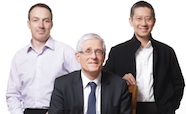An excerpt from He Kitenga Horizons, a University of Otago publication, December 2013
A virtual biobank is set to be the centrepiece for a multidisciplinary nationwide initiative being spearheaded by the Centre for Society, Governance and Science (SoGoS) based in Otago's Faculty of Law.
SoGoS researcher and project manager Richman Wee says the Human Tissue Research Vision 2020 initiative is designed to promote science outcomes and excellence in all research involving human tissue samples. The aim is developing strategies to future-proof human tissue research (HTR) in New Zealand and create a voluntary collective for researchers.
Law Faculty Dean and SoGoS co-director Professor Mark Henaghan is providing legal, ethical and policy advice for the development of the virtual biobank. It will initially involve Otago researchers across the three main campuses in Dunedin, Christchurch and Wellington, and then be extended to make it inter-institutional by bringing in other universities and Crown Research Institutes.
"Essentially we provide a platform," explains Wee. "The ultimate aim is for translational research and this is one of the means to bring this about in the long term."
Central to that is the recently launched HTR Nexus, an online web platform that is being designed in conjunction with Dr Jon Cornwall (Anatomy) to support and network the HTR community.
"Before we can get to translation we need a grouping of researchers to work together, to create that socialisation of people in health research, particularly human tissue research."
Wee says the virtual biobank concept, which he developed out of his PhD thesis on biobanking, would reduce the amount of governance needed.
"What we wanted was a federated system so that researchers still have autonomy and can continue to collect samples, managing them and controlling access, but they are all talking to each other.
"They know what each other is doing, how they are doing it, the technical standards, the best practices and there can also be a wiki so they can have a discussion thread about the issues they face."
They also wanted to address researchers' concerns that calling it a biobank would mean they would have to share their samples.
"That is why we are saying it is not really a biobank structure. Let's take it one step back and work on a platform where people working on human tissue samples can get together and figure out where they want to get to, which is translation," he says.
"But to get there, one of the important things is harmonisation of standards, of practices, of ethical norms, an understanding of law. By bringing a group of people together on a voluntary basis they can then have a discussion amongst themselves about what the standards are.
"We are not telling them what standards to use – it's up to them to decide. But we provide the forum, the avenue, the platform. SoGoS will also provide the ELSI – the ethical, legal and social implications."
Wee says it is a way of providing a framework for researchers throughout the process, from designing the research and obtaining ethical approval, to looking at how will a test be validated.
"That way it also speeds up compliance with regulatory issues and researchers are working according to best practice standards."
It should also open the way for researchers to not only share samples, but also compare studies – or pool samples to create bigger studies.
Wee believes the platform is a way to maintain public confidence and trust in how research using human tissue samples is carried out.
"I think it is time that researchers were proactive in providing public information about what human tissue research is being conducted and who conducts it. So it actually provides transparency. It will also allow the public to raise questions."
FUNDING
University of Otago

Dr Jon Cornwall, Professor Mark Henaghan and Richman Wee: "Essentially we provide a platform. The ultimate aim is for translational research and this is one of the means to bring this about in the long term."